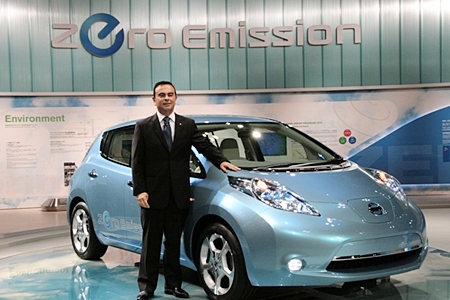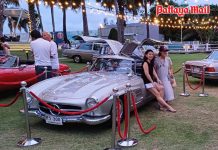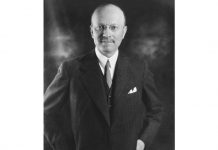Bangkok is going to have some electric vehicle (EV) recharging stations. As reported in the Pattaya Mail, the Metropolitan Electricity Authority (MEA) unveiled Thailand’s first EV charging station for the public, with a total of 10 stations expected to be launched by the end of this year.
According to MEA Governor Atorn Sinsawat, the agency supports the use of environmentally-friendly electric cars, as the vehicles run on clean energy. The first EV station is now open for use at the MEA’s headquarters, with nine more to be built before the end of December. Members of the public can use the station’s services for free until July 31, 2013.
 Renault Leaf.
Renault Leaf.
The agency also plans to order 20 electric cars for its own use within the next four years. This is good, as I do not know of too many EV’s running along Sukhumvit at present to use their free top up charge!
However, is the push for EV’s just a passing fad and Bangkok is leaping on the wagon a little too late? Are EV’s something that will again go on the back burner when it becomes obvious we won’t run out of oil?
One interesting group in the manufacturers is the Renault Nissan Alliance, led by Carlos Ghosn. This was founded in 1999, and its objective is to rank among the world’s top three vehicle manufacturers in terms of quality, technology and profitability. And the Renault Leaf EV technology is now available through your friendly Renault Nissan dealer (as long as there is a recharging station around the corner).
Carlos Ghosn, President and CEO of Renault and President and CEO of Nissan said, “To reconcile the demand for individual mobility with the preservation of the environment and high cost of oil, the Renault Nissan Alliance is committed to the development of “zero-emission” vehicles (ZEV).”
The ZEV concept was not just an American movement, as in November 2008, UPS announced an order of twelve electric vehicles from Modec, the manufacturer of the world’s first purpose-built zero-emission van. Six vehicles were introduced into UPS’s UK fleet in February 2009. The remaining six were in operation in Germany.
Modec vehicles were designed around a large, removable battery cassette. Two battery capacities were available; offering 160 km range or a 100 km range, on a single overnight charge. However, this was Utopia, as Modec went bust last year. The world is still not convinced that “clean energy” is top priority.
Interestingly, globally, the UPS people have been utilizing alternative fuel vehicles for more than 70 years. It currently operates the transportation industry’s largest private fleet of alternative fuel vehicles. UPS’s use of alternative fuel vehicles dates back to the 1930’s with electric vehicles in New York City, and today the company uses alternative fuel vehicles in Brazil, Canada, France, Germany, Mexico, the UK and the US. But this alternative fuel position didn’t stop Modec going to the wall.




